Crusader Kings 3: First steps
On this page of the Crusader Kings 3 guide you will find descriptions and explanations useful at the beginning of each new game.
Last update:
If Crusader Kings 3 is your first game in the series, you'll need to learn a ton of information and avoid many different pitfalls which could easily ruin your initial playthrough. Therefore, in this part of Chapter I we'll discuss what you should do before unpausing the flow of time at the start of the game, and how your first steps should look like. For this purpose we'll begin our playthrough in 1066 as the ruler of the Kingdom of Poland - Boleslaw II the Bold. Poland is an interesting starting area, which offers opportunities to learn about most of the game mechanics and teaches you how to manage a medium-sized feudal kingdom. You must remember that when starting a new game, the conditions you encounter may be slightly different. Some characters have randomised stats with each new playthrough, which means some of the problems we're describing may not occur in your game or occur in a different way. This page is going to use an exemplary playthrough to show you what you should pay attention to first. Time to get started!
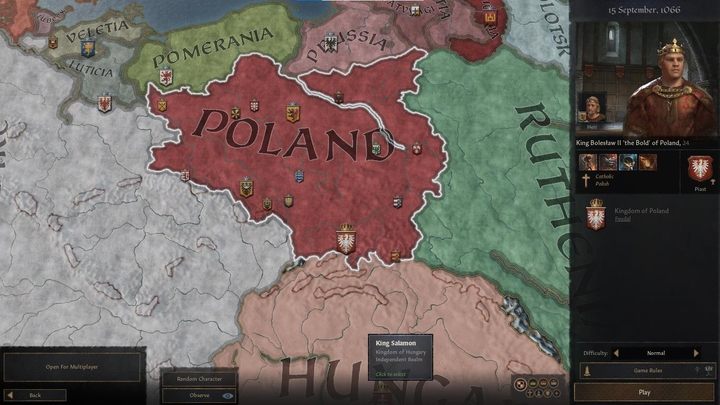
Select New Game from the main menu, then click the Play as any Ruler in 1066 button in the lower-left corner of the screen. Find Poland on the map and click on its territory. On the left you'll see a preview of King Boleslaw II the Bold. We'll start the game on the normal difficulty without changing any of the gameplay rules, so you can immediately click Play to start.
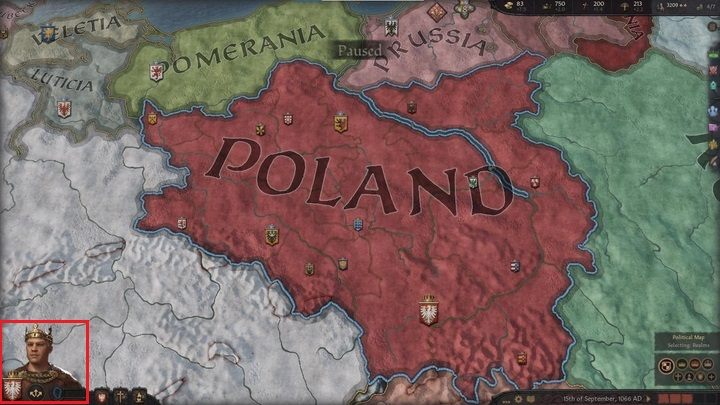
Each new playthrough starts in an active pause mode, letting you easily familiarise yourself with the current situation. There are a lot of things you must take care of before unpausing the game for the first time. First, let's take a closer look at our ruler. Click on the ruler model in the lower left corner of the screen.
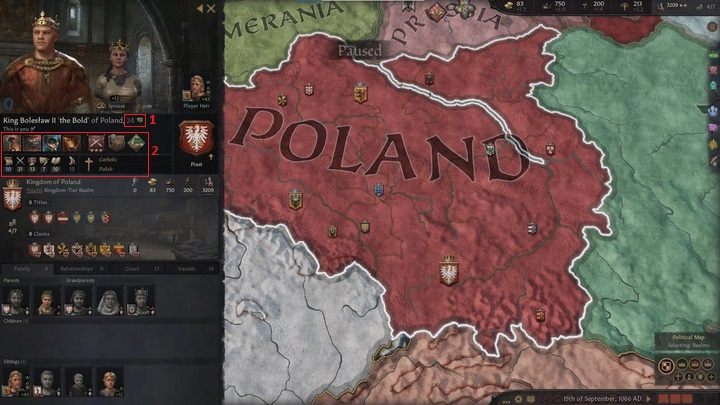
On the left you'll see the character preview window we've described in detail on the User Interface page. As you can see, Boleslaw is 24 years old (1), while his traits and stats (2) indicate his biggest strength is commanding the military.
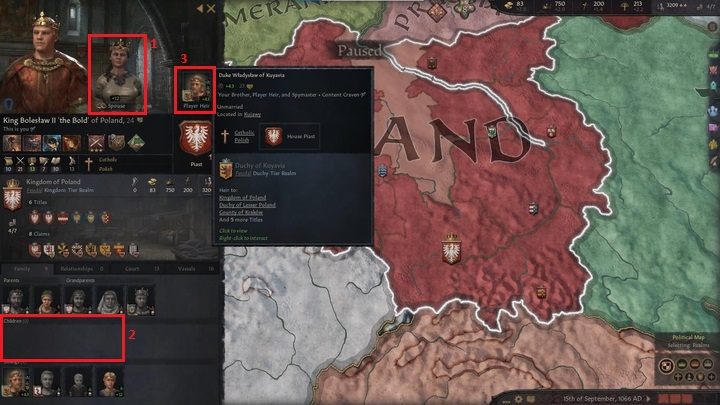
You already have a spouse (1), but you do not have children (2), so your current rightful heir is your brother (3) - Duke Wladyslaw of Kujawy. This means that if Boleslaw dies, the royal title still remains in your dynasty, letting you continue the game.
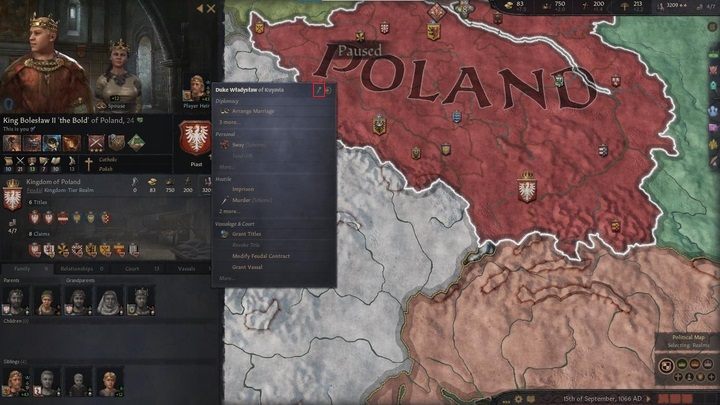
Nevertheless, you must constantly pay attention to the throne's succession, so you should start observing Duke Wladyslaw. To do so, left-click on his portrait and select the pin icon from the drop-down menu.
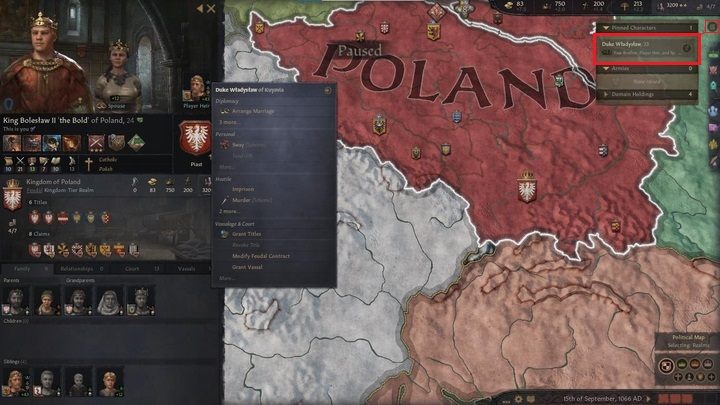
From now on, your brother and heir will be visible in the Outliner in the upper right corner of the screen, and you'll also receive a notification in case he dies.
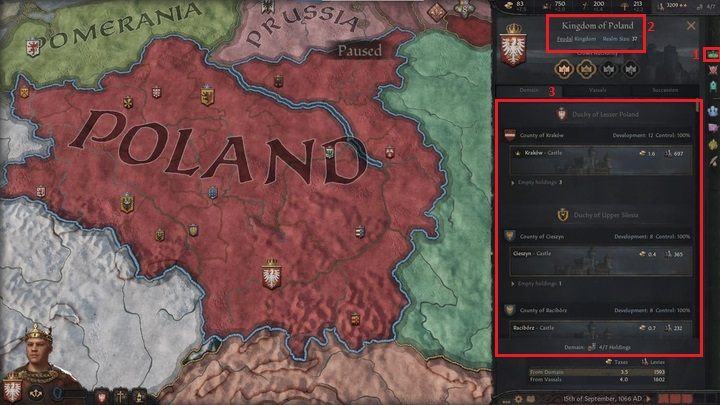
Now let's take a look at the kingdom itself. To do so, open the kingdom management window (1). Your main title is the Kingdom of Poland (2) - it consists of 37 counties and is ruled feudally. You personally possess 4 counties (3), one of which is located in the Duchy of Lesser Poland, the remaining ones in the Duchy of Upper Silesia.
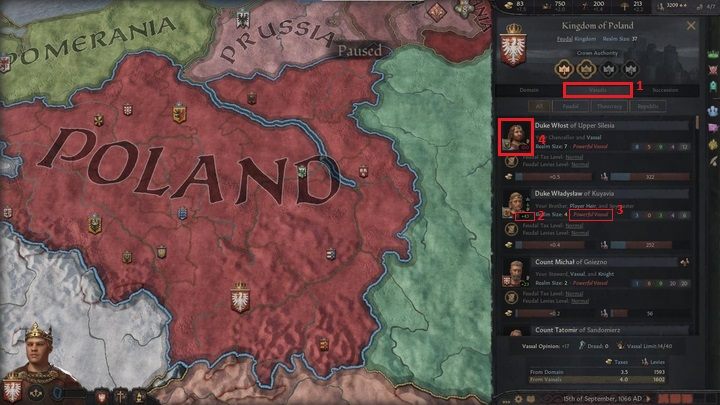
Now let's check the Vassals tab (1) to take a look at your direct vassals. As you can see, you have 14 vassals in total, each of them having a minor bonus to their opinion of you (2). The strongest vassals are marked with a red Powerful Vassal inscription (3) - you should always keep an eye on them. The first of them, Prince Wlost from Upper Silesia, views you negatively (4). Click on his portait to see what the problem is.
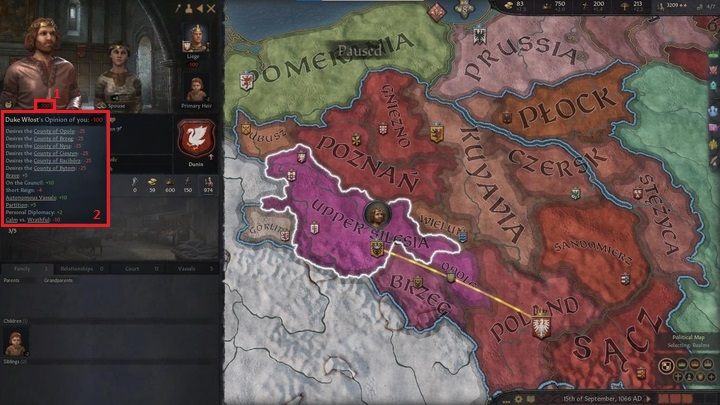
When examining the selected vassal you'll see his character window on the left, the world map will change slightly as well. The whole country is now surrounded by a blue outline, but inside you can see how it's divided territorially. As you can see, the domains belonging to you (lands marked as Poland) and your brother (Kuyavia) are quite large and surrounded by lesser vassals with count titles. The exception is, obviously, the Duke of Upper Silesia, who's the only vassal with a large domain. Underneath his model you can see his opinion of you (1) - when you hover your cursor over this indicator, a list of variables influencing the opinion will be displayed (2). It turns out Prince Wlost wants to control six counties which don't belong to him and it's frustrating him greatly.
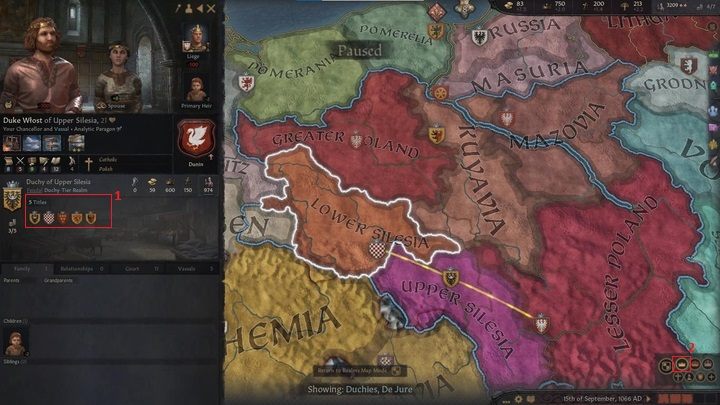
Since we already know what your most powerful vassal demands, it's worth thinking about what drives his ambition. If you check the Duke's titles (1) you'll see he doesn't have only a single one - he has two, for Lower and Upper Silesia respectively. It's worth checking which territories legally belong to those titles. To do so, activate the de jure map mode (2). It seems that Duke Wlost fully controls Lower Silesia but has no power over Upper Silesia, even though his ducal title should grant him control over it. There are several ways out of this situation, but for now it's most important that we've managed to correctly diagnose the issue. We should continue our kingdom overview.
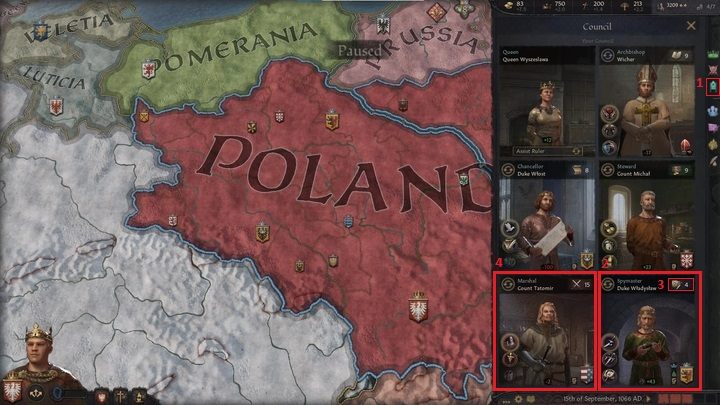
Another important matter requiring your attention is inspecting the Royal Council. After opening the appropriate window (1) you'll see your advisors along with their stats. You should especially pay attention to your Spymaster (2), as his intrigue stat (3) is 4. This is not optimal for two reasons. First of all, it's a very low stat for such an important position. With his intrigue being so low, the Spymaster may be unable to uncover enemy plots in time, which could even cost you your life. Secondly, your current Spymaster is your brother, Duke Wladyslaw of Kujawy. Remember that you have powerful opposition in form of Prince Wlost - you shouldn't anger your greatest ally, and your heir, by depriving him of his position in the Council. What's worse, the Duke of Upper Silesia himself is also a member of the Council, so you won't be able to improve your relations by offering him a prestigious position of royal advisor. This means we have yet another problem to solve. Finally, you should pay attention to your current Marshal (4). Currently this position is taken by Count Tatomir of Sandomierz, who has excellent stats. You should keep an eye on powerful characters like him - and you should also keep them on your side. Hence, you should consider improving your relations with Tatomir.
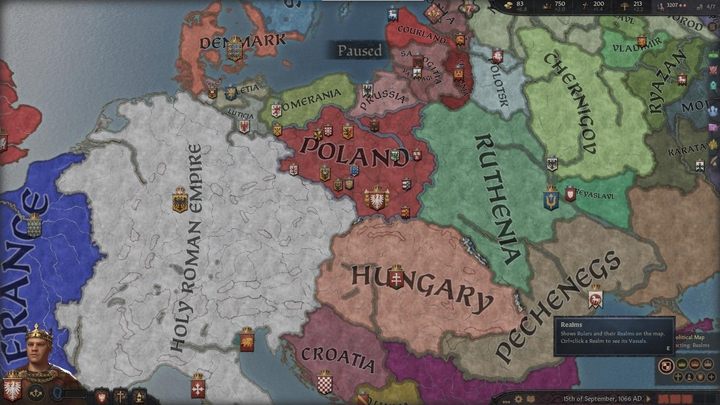
Now it's time to deal with international affairs. If you zoom out the map a bit, you'll see you're surrounded by three powerful neighbors: Ruthenia on the East, Hungary on the South and Holy Roman Empire on the West. There are also two smaller duchies to the North: Pomerania and Prussia. You should first focus on them.
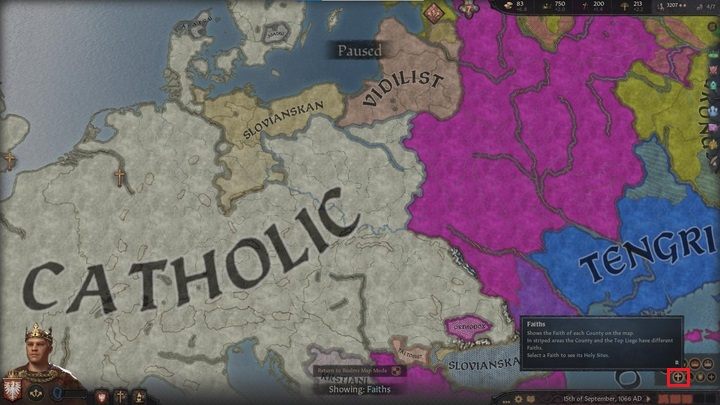
This is not only due to the northern duchies' small size, but most of all to their dominant religion. By changing the map mode to religion you'll be able to see how almost all of Western Europe, including the Holy Roman Empire, practices Catholicism. This also applies to most of the Balkans, including Hungary. The dominant religion in Ruthenia, on the other hand, is Orthodoxy, which means all of your powerful neighbors are Christians. This matters to your future expansion, as your Kingdom is Christian as well, and declaring war against countries sharing your religion is more difficult than attacking non-believers. The Northern duchies are still pagan, which means you can spread Christianity there with military means.
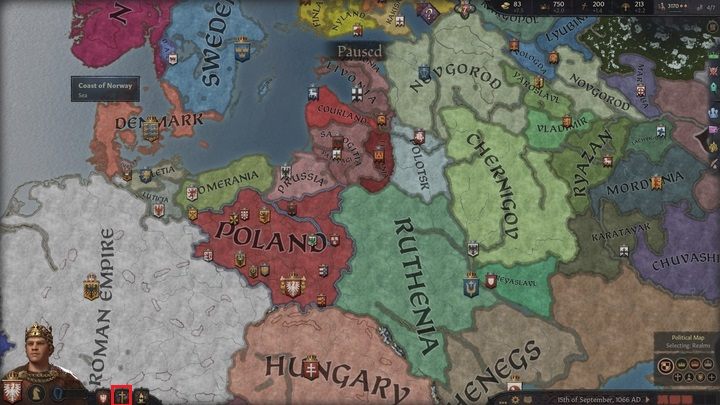
Since we're on the topic of religion, it is also worth getting interested in culture. Developing technology in Crusader Kings 3 is closely related to your country's culture. Culture is a broader term than a kingdom so you won't always be able to directly influence the technology's development, but we'll describe that in more detail in a Kingdom Management chapter. For now we suggest you to open the culture window by clicking the candle icon in the lower-right corner of the screen.
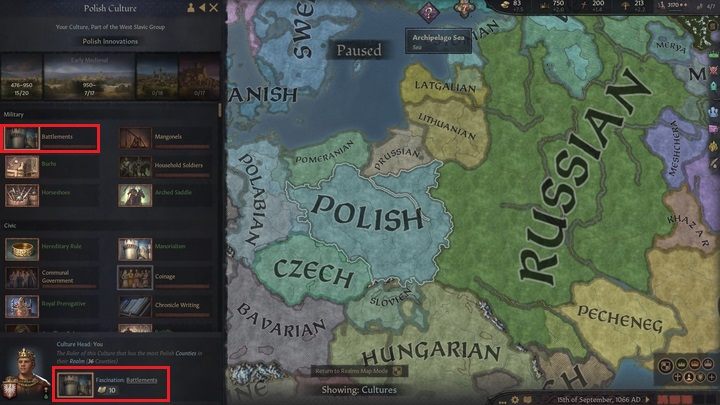
As you can see, the cultural situation is pretty clear in 1066 - Polish culture reigns supreme throughout your entire kingdom. This is a good thing, as it means you can directly decide which technology will be developed next. At the moment the country is developing Battlements, which you can check with the menu on the left. This is a pretty good option, as it will allow you to expand defensive fortifications in your settlements. You don't need to change anything here for now, but it's still worthwhile to look through other available options and plan your future development.
After quickly looking through the situation you know you're playing as a young, war-focused ruler. You don't have a son, but you do have a wife, which means the matters of heritage are promising. Your internal situation is complicated because of a single powerful vassal making inconvenient claims, and you'll most likely have to expand to the north eventually. It's finally time to take direct action. I suggest you start by developing Boleslaw.
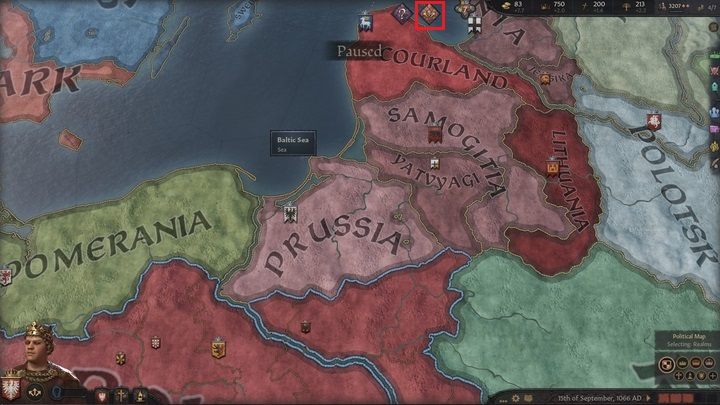
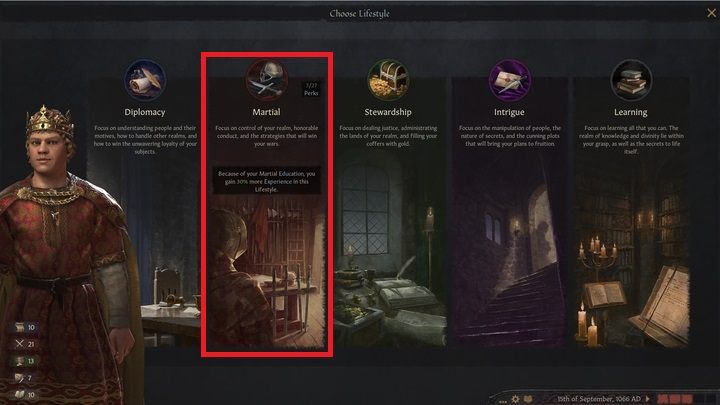
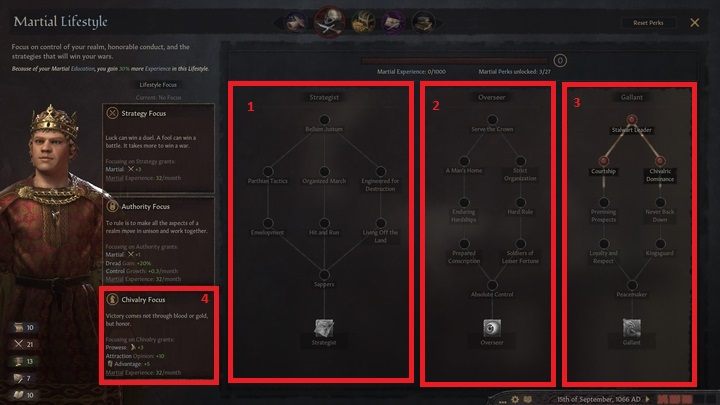
He's militarily gifted, so the military path should be an obvious choice. You can choose from three skill trees, from which the first one (1) focuses on commanding the army, the second one (2) on internal security and the third one (3) on direct combat. Each tree offers some interesting skills, but for now we suggest going down the direct combat tree. Boleslaw already has some perks from this path, which means you can complete the tree faster and reap maximum benefits. To do so, select Chivalry Focus (4) on the left. Your choice will increase Boleslaw's melee capabilities, and will allow you to increase them even higher in later stages of the game by going down this specific skill tree. You'll find more info regarding character development in later chapters.
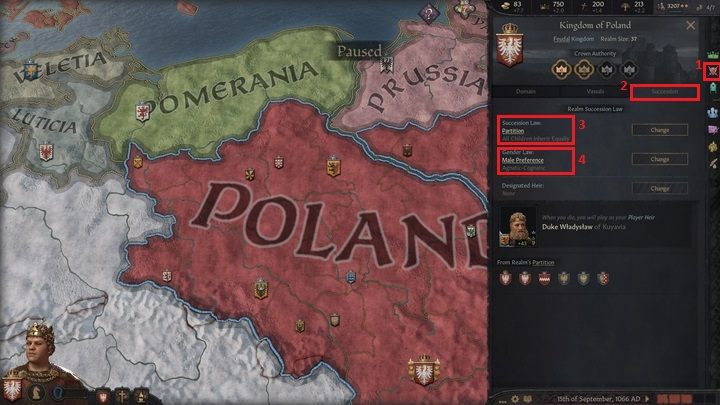
It's time to handle the matter of heritage. To do so, open the kingdom management window (1), then enter the succession tab (2). Your kingdom's current inheritance law (3- partition ) states that all your titles will be divided equally among your children upon your death. Moreover, only your male children can be legitimate heirs (4). There's nothing unusual about it, and there's nothing you can do about it at the moment, but you should still know that's the case.
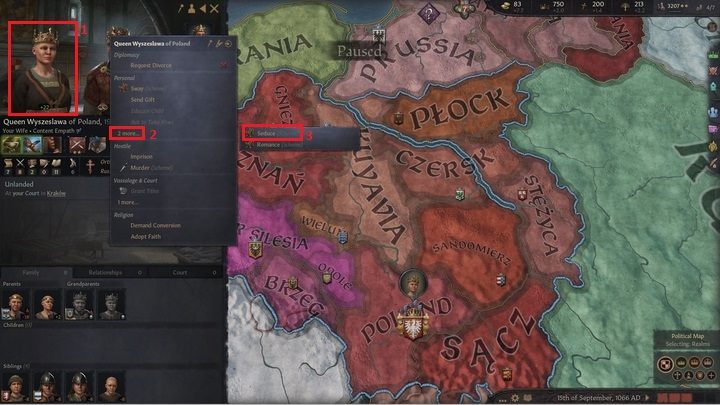
There's a much more serious problem regarding your heritage - Boleslaw has no children. I'll abstain from explaining to you how children are made, instead I recommend you improve your relations with Queen Wszeslawa - Boleslaw's wife. To do so, open her character sheet and then right-click on her image (1). Select the more tab (2) in the drop-down menu, letting you see all your currently available options. All of the currently available plots should increase the relations with your wife, but the most promising one in terms of heritage is seducing her (3).
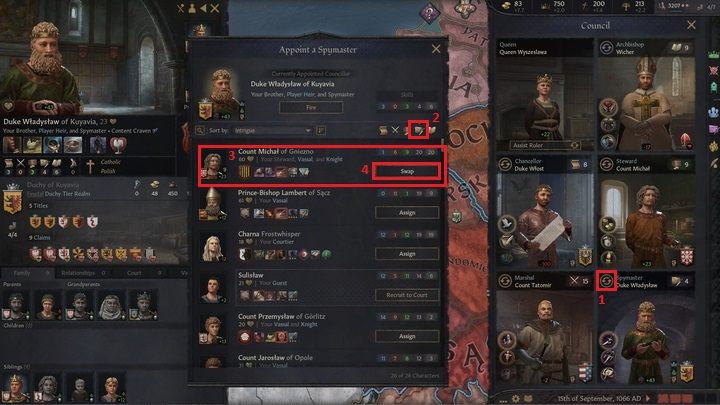
Next, we must deal with your Council. Your brother, Duke Wladyslaw, definitely shouldn't be the Spymaster. To check your available options click the two arrows icon (1) above his portrait. This will display a list of potential candidates you can sort by their intrigue stat (2). It turns out your Steward, Count Michal of Gniezno (3), has his Intrigue maxed at level 20. Since the Count is also your Steward, you can simply swap (4) their positions.
By doing so you won't deprive your brother of his position in the Council and you'll limit the damage he can cause. Unfortunately, he's just as bad at Stewarding as he is at Spying, which means he's still going to mess up often. The thing is, having a powerful Spymaster is absolutely critical when your opposition is strong.
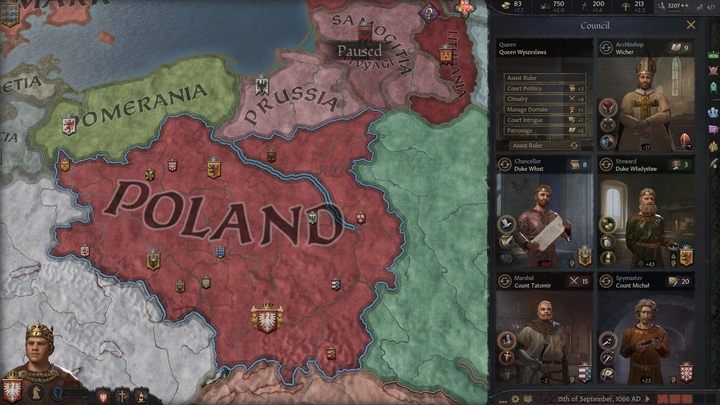
The last thing you need to handle in the council is assigning tasks to the specific positions. The situation in the country seems stable at the moment, so you can leave most options unchanged. It's still worth it to ask your partner for some help though. Her military skills are pretty high, so you'll get a large bonus if you ask her to handle these matters. To do so, click on the two arrows icon under her portait (1), then select the appropriate option in the drop-down menu (2).
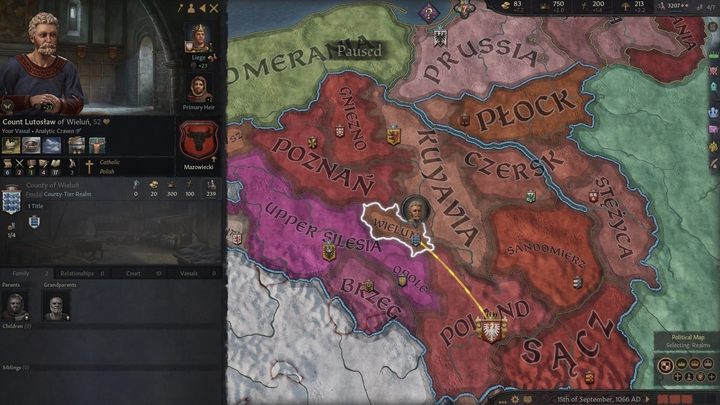
Finally, you should handle some personal matters. As you already know, Prince Wlost acts as strong opposition in your domain. Some minor vassals are also worthy of your attention because of their skills. You should also spend a few moments with your not very bright brother. We'll use him as an example to show you how to transfer titles and influence the relations with your vassals.
You should know how to check what influences the NPCs opinion of you, we've already done it with Prince Wlost. It turns out your brother would like control over the Wielun county, as it's part of his de jure lands. By finding Wielun and marking it on the map you'll see its ruler is Lutoslaw, your direct vassal. Lutoslaw is a Count while Wladyslaw is a Duke, this means you can assign the vassal to your brother, satisfying his ambitions and significantly improving your relations.
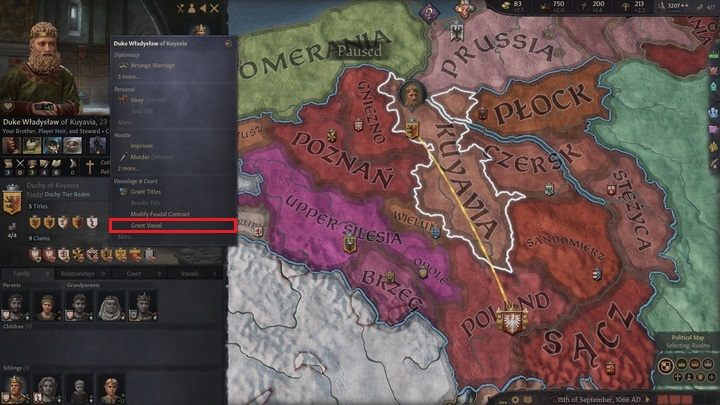
To do so, open your brother's context menu and select Grant Vassal (1).
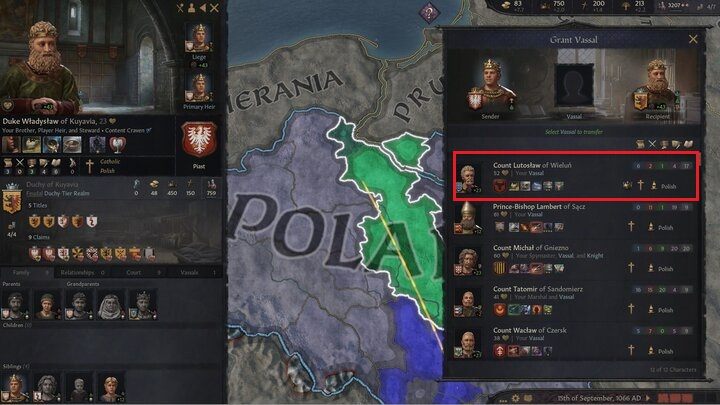
In the next window, find and select Count Lutoslaw.
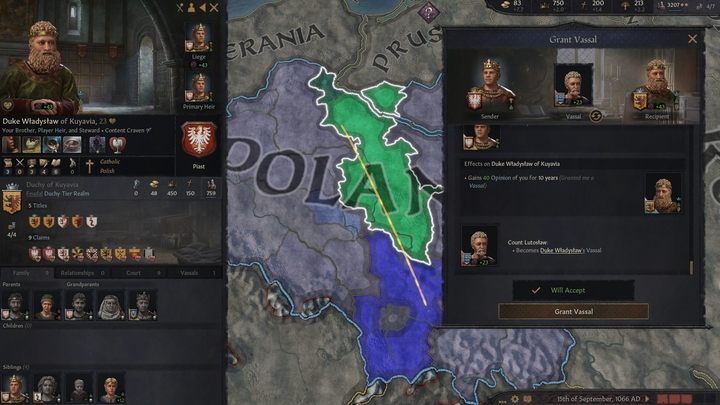
This will improve your brother's opinion of you by 40, which is a lot and should guarantee his loyalty.
There are two more vassals in your council you should improve your relations with. We're talking about Count Michal and Count Tatomir. Giving them titles is a pretty drastic measure, but instead you can start a plot to improve your relations (as you did with your wife) or simply send them some gold and buy their friendship.
The last major problem is your conflict with Prince Wlost. Unfortunately there's no unambiguously correct solution here, and in fact, this is where Crusader Kings 3 really opens up. You can try to smooth out the conflict with plots or gifts, or even grant the problematic vassal some contradictory titles. You can also fabricate a claim to his lands or start a plot to permanently erase his threat. In any case, however, it is worth waiting a bit first to see how the events unfold. It's possible you'll be able to guarantee your other vassals' loyalty, preventing the opponent from forming a harmful coalition.
Regardless of your decision, you now know how to check your kingdom's status and how the game's basic mechanics work. You can finally unapuse the game for the first time, see the consequences of your actions and start planning your next moves.
- Crusader Kings 3 Guide
- Crusader Kings 3: Game guide
- Crusader Kings 3: Basics
- Crusader Kings 3: The game's objective
- Crusader Kings 3: Starting your first playthrough
- Crusader Kings 3: Ruler selection
- Crusader Kings 3: Interesting starting locations
- Crusader Kings 3: Interface Guide
- Crusader Kings 3: Map modes
- Crusader Kings 3: First steps
- Crusader Kings 3: Difficulty levels
- Crusader Kings 3: Gameplay settings
- Crusader Kings 3: Basics
- Crusader Kings 3: Game guide
You are not permitted to copy any image, text or info from this page. This site is not associated with and/or endorsed by the developers and the publishers. All logos and images are copyrighted by their respective owners.
Copyright © 2000 - 2025 Webedia Polska SA for gamepressure.com, unofficial game guides, walkthroughs, secrets, game tips, maps & strategies for top games.
